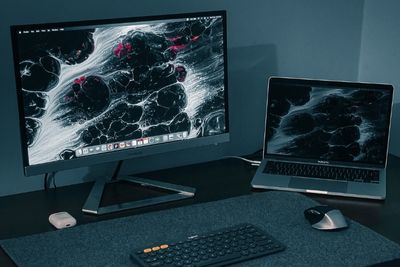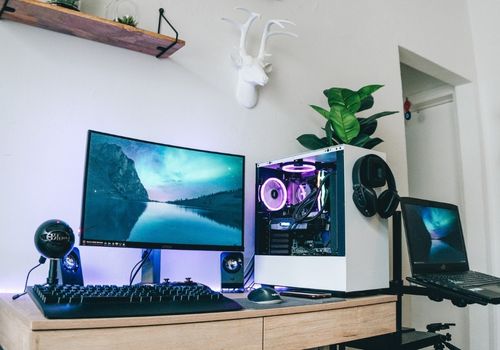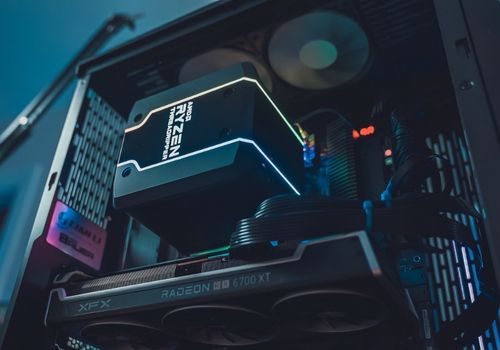
The amount of watts your PC uses depends on what type of computer it is. If it's an entry-level laptop, it'll need around 30 to 100 watts per hour to work. However, if it's a more high-end workstation, it can power draw up to 1500 W an hour.
I own a dual monitor setup, and I figured that my extra monitor was running up my electricity bill. However, I couldn't tell for sure until I used a power supply calculator to figure out how much electricity it was consuming.
I have explained how to do this, along with how you can reduce your PC's power consumption, and what to do if your computer consumes more electricity than it should.
Let's get to it.
Contents
The answer depends on the type of computer you own. More specifically, the extent of its parts. If you own a more basic PC, it won't have many components that consume a lot of electricity.

Here's a quick breakdown:
Do you have a dual monitor set-up? You'll have to add another 30 to 40 W to the above-mentioned amounts if this is the case.
Also, here's a disclaimer - the wattage I mentioned is not set in stone. Your CPU or GPU may be more powerful, so it could use up more power compared to other devices.
You can go ahead and calculate your PC's power consumption yourself. If you're ready to do this, there are 3 different methods you can turn to.
Watt meters are arguably the most accurate way to measure power consumption. All you have to do is plug it into a wall socket, and connect your PC to the power meter. You can either do this directly or through a power strip.
Although you'll find out the actual power consumption in real time, it won't break down the reading for you. It will just show you the amount your PC has been using as a whole.
So, which watt meter do I recommend? The Kill A Watt meter is my pick. I've used it many times to calculate electricity costs.
Although this is not as accurate as using a watt meter, the Open Hardware Monitor software is also a good way to get real-time readings of your computer's power consumption. I particularly like the fact that it's free and open source.
To use it, you'll first have to download the Open Hardware Monitor tool. Once this is done, unzip it to get it to launch on your PC.
It will collect the energy usage from your computer components when you click on the automatic scan option.
Last but not least, let's talk about the selection of online tools out there. There are a couple that will help you check your computer's power consumption. However, don't expect very accurate readings when you use them. You will only get rough estimates, which is why I placed them at the bottom of my list.
The Outervision Calculator is the best online tool that you can use. You can choose whether you want an expert reading or a more basic one.
When it comes to the basic reading, you'll have to input the specs that the power tab asks, how long you use your computer in a day, and whether you use your PC for any power-intensive processes, like gaming, video editing, or 3D rendering.
What is the difference between the basic and expert options? As you would have guessed - you'll get more reliable readings when you choose the Expert option.
Just remember that you'll have to include more data about your set-up, like your fan speeds/clock speeds, LED systems, and any liquid cooling kits that you may use.
Be Quiet's PSU Calculator is another good online tool. It uses the peak power consumption for each of your PC components to calculate the overall power consumed.
However, your PC's CPU and GPU are not utilized all the time. So, Be Quiet's PSU calculator is not the best thing to use if you want to know how much energy you're using when your computer is on idle mode.

It's pretty obvious why tracking your PC's power consumption is important - you'll be able to find out whether you're using too much power. This way, you can cut down on your online usage.
Reducing the power you use won't just help you save on your electricity bill, but can actually help you prolong your device's life. Ultimately, lower power draws mean less heat being emitted, which is a huge culprit behind hardware failure.
Knowing how much power your computer uses will help when upgrading your PC parts. You might learn that your Power Supply Unit can only pump out a specific voltage, so you will be able to stay clear of extra high-performance components.
You might be put off by how much power your PC uses. It's frustrating when you get a huge electricity bill.
That's what I'm here for. There are some easy ways to reduce your PC's energy consumption.
Let's talk about them.
The best tip is to shut down your PC when you're not using it. You won't have to worry about astronomical electricity bills, as your computer won't be sucking up power from your wall outlet when not in use.
It's annoying to constantly boot your computer if you're a busy guy. Well - an easy workaround would be to switch Sleep Mode on. In basic terms, electronic devices go into hibernation when it's switched on.
To use it:
While on the topic of shutting down your PC, let's talk about smart strips. Even though you may be trying your best, you might keep forgetting to turn your PC down and end up wasting a lot of power.
Smart strips can automatically detect when your computer is not in use and cut off its power supply.
No surprise, lowering your screen brightness can also put a cap on how much power your PC uses. Your processor will use up less CPU utilization, which will translate to lower power usage.
You probably like using RBG lights if you own a gaming PC. Although they look great, they end up using a lot of power, especially since they stay on when your computer isn't being used.
How exactly do you turn off these LED lights? Depending on your device model, there might be an off switch. Otherwise, you'll have to either use your BIOS settings or the CORSAI tool.
Even when it comes to using BIOS and CORSAI, the process to follow differs depending on what your PC model is.
If you've regularly been checking your PC's power usage and realized that it's sucking up way more power than it should, I have some bad news for you. You might be dealing with malware. This could constantly be working in the background and eat your PC's resources.
Open your anti-virus and check its alerts. There should be an alert asking you to take action if there is a virus or malware.
Your local cooling might be doing a poor job. There are many reasons for this. For one, there could be dust jammed in your CPU fan. Unscrew your computer's case and grab a compressed air can to shoot any dust out.
If you haven't upgraded your computer's parts in a while, it might be time to do this. They could be sucking up more power than necessary.
When it comes to gaming PCs, swapping out the parts is easy - they were designed for this, after all. In case you own a normal PC, this is easier said than done. Check out a tutorial on what you should do for your computer model.
Also, don't go swapping out every part. I have a separate article where you can learn more about this topic.
If your computer needs 300 w/hr, you'll need to get two panels that generate a combined total of 400 watts.
When you do the math, you'll realize that there's an extra 100 being generated. You can use this for additional gadgets, like USB devices/external devices and other peripherals.
Answered below are some popular questions.
Your PC's processor and graphics card use up the most power. The motherboard and Power Supply Unit do too, but they pass all of this to other components to keep them going.
PC power consumption can differ depending on your PC model, and the specific components inside. In general, though, an entry-level laptop would use up to 100 watts an hour, while a high-end workstation (gaming computer) could use around up to 1500 W an hour.
Depending on the number of monitors you have connected, you can add around 50 watts to this equation.
I have provided a rough estimate on how much power your PC uses, discussed how you can calculate your computer's overall power usage, how to save energy, and find what your exact power requirements might be.
